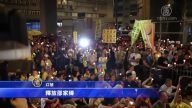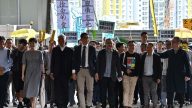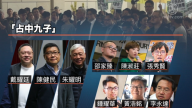【新唐人2014年10月11日讯】他是法律学者,却站在“公民抗命”运动的中心;他是教授,却支持学生罢课;他提出占中,但却是为了“不占中”……这就是戴耀廷,一个似乎带着些矛盾,但却给香港打开了一把和平理性之伞,以抗衡专制风暴的人。今天,我们就来看看戴耀廷的矛盾,和他的坚持。
占中发起人之一戴耀廷:“占领中环正式启动。占领中环正式启动。占领中环正式启动。”
9月28号凌晨,戴耀廷的这句话,启动了港人“和平占中运动”。就在当天,港府用胡椒喷雾、催泪弹,强硬压制手无寸铁的市民和学生,反而激发了更多市民走上街头,撑起一把把雨伞来保护自己,同时也向港府和北京表达争取真普选的决心。
今年50岁的戴耀廷,是香港大学法律系的副教授。1989年从港大法律系毕业后,戴耀廷曾经在李柱铭办公室担任法案助理,参与《香港基本法》起草。他是“基本法咨询委员会”里两位学生代表之一,之后他又从英国伦敦大学捧回了法律硕士学位,回到香港教书,他研究的主题是神学、法律与宗教、人权、中国宪政与参与式民主。
其实,身为法律学者的戴耀廷,并不是不知道“公民抗命”意味着什么。
去年1月16号,戴耀廷在信报专栏写下《公民抗命的最大杀伤力武器》,引起震撼。他在文中逐条分析对“和平占中”的设想,其中包括一条“承担罪责”。戴耀廷写道:“公民抗命的行动属违法行为……行动结束后,参与者应自行向执法部门自首。”
但是,也许正因为是法律学者,戴耀廷才这样义无反顾。就像他在eetv“港人讲事”专访中所说──
戴耀廷:“我本身研究法治都有二十多年以上,在法治的理论当中,我们说的法治,不是守法这么简单。即使很多人觉得法治等于守法。但其实法治更高层次的理解,是法律必须要符合公义的要求。在现行的制度本身,是不符合公义的时候,历史上我们可以看到很多人采取公民抗命的运动。”
而身为教师,戴耀廷也不是不明白,学生“罢课”意味着什么。当学生在政府总部前静坐,遭到警察清场的时候,他也在那里。
戴耀廷:“信息很明确,我们将和学生并肩作战。我们将和你们一起,坚持到最后一分钟。”
也许,正因为他把自己定义为教师,才希望越来越多的香港人,能够加入这个“街头民主大学堂”。就像他和另两位占中发起人在《和平占中信念书》里所说:把民主普选、公平公义这些普世价值传扬给香港人,并希望他们愿意为了在香港的制度和社会落实这些价值而付出代价。
戴耀廷:“我们一定,一定,要对全世界非常清晰的声明:占中不是颜色革命。这只是香港人争取民主的一个运动,为了有自己的权利,平等的权利,这是香港人应该享有的。”
和平占中运动获得全球支持,但质疑、压力也一波接一波。面对这些,戴耀廷并不是无动于衷。
对于香港市民,他多次表示歉意,请求他们体谅占领行动造成的不便。但对于港府,他则是针锋相对。
戴耀廷:“我们会继续,一直继续。我们要记住人们为什么走上街头,并不是因为学联,学民思潮,或是占中的召集,而是因为催泪弹,因为政府不愿回应港人的普选诉求,所以人们才走出来。这就是我们的要求,这个问题只有政府才能解决。”
如今,占中已经成为97年香港回归以后,北京面临的最大抗议。不过,戴耀廷却说,他重视的并不是对抗。他在接受台湾《天下》杂志专访时说:“占中是为了不占中,就是要透过对抗产生一种张力,占中是未来的紧张,让大家回到谈判里。”他说,重视的是民主的商讨,透过讨论的过程,希望找到解决纷争的方法。
但是,由于港府单方面宣布搁置对话,学界呼吁坚守街头,占中运动还将持续下去。而戴耀廷所希望看到的,港人追求民主的意识,也将通过一把把撑开的雨伞,继续在香港街头,形成追求民主的风景线。
编辑/尚燕 剪辑/黎安安
Benny Tai: Occupy Central Is to Not Occupy Central
He is a law scholar standing in the center of a civil disobedience movement. He is a professor supporting the student strike.
He proposed Occupy Central so that the Central “is not occupied." He is Benny Tai, a seemingly contradictory figure who opened an umbrella of peace and rational to fight a storm in Hong Kong.
Today, let’s take a look at Benny Tai and his contradictions and insistence.
Benny Tai: “Occupy Central has officially launched. Occupy Central is officially launched. Occupy Central is officially launched."
On the morning of Sept. 28, Benny Tai initiated Occupy Central in Hong Kong with love and peace. On the same day, the Government’s tough repression of unarmed citizens and students with pepper spray and tear gas has motivated more protesters.
They hold up umbrellas to protect themselves and to demonstrate to the Government and Beijing their determination to fight for true universal suffrage.
The 50-year-old Benny Tai is an associate professor of Law at the University of Hong Kong. After graduating from Faculty of Law, University of Hong Kong, he has served as an assistant in legislator Martin Lee’s office, participating in the draft of Hong Kong Basic Law. He was one of the two student representatives in the Consultative Committee for the Basic Law. He received his master’s degree in law from London School of Economics and Political Science and specializes
in constitutional law, administrative law, law and governance, law and politics as well as law and religion.
In fact, as a law faculty member, Benny Tai is aware of the meaning of civil disobedience.
Last Jan. 16, Benny Tai published a stirring article in the Hong Kong Economic Journal entitled, “The Largest Mass Destruction Weapon of Civil Disobedience." He analyzed and listed the possible plan and consequences for Occupy Central, which included being held accountable. He stated, “Civil disobedience is illegal…after the movement, participants should surrender themselves to law enforcement."
However, perhaps his legal scholar identity has Benny Tai make the decisive move like what he had pointed out in the interview with EETV program, SpeakOut.
Benny Tai: “I have studied the rule of law for more than twenty years. In theory, the rule of law is not as simple as law-abiding; many people even think that way. But in fact, a higher level of understanding of the rule of law is that the law must meet the requirements of justicein the existing system itself.
When the current system itself is not consistent with justice, we can see in history that many people began civil disobedience movements."
As a faculty member, Benny Tai understands what the student strike means. He was present when students who were holding sit-ins in front of government headquarters were cleared by police.
Benny Tai: “Well, I think the message is very simple. We will stand with you (student protesters) together. And we will stay here till the last minute with you together."
Perhaps his teacher identity has given him hope that increasingly more Hong Kong people will join this street democracy.
As he and two other Occupy Central promoters have said in the official release on the Occupy Central, “Spread the universal values of democratic universal suffrage, fairness and justice to the people of Hong Kong, and hope that they are willing to pay the price to implement these values in the institution and community in Hong Kong."
Benny Tai: “We must, we must, state it very clearly to the whole world: this is not a color revolution. This is only a movement of Hong Kong people to strive for democracy to get their rights, equal rights, which should be enjoyed by the Hong Kong people."
Occupy Central has won global support, as well as waves of questions and pressure. Faced with these, Benny Tai is not indifferent.
To Hong Kong people, he repeatedly apologized, asking them to understand the inconvenience caused by the occupation. But to the Government, he is tit for tat.
Benny Tai: “We will continue, will continue. Again remember what has caused the people to come out. It’s not out of a call from the federation of students, Scholarism or Occupy Central. It’s because of the tear gas. It’s because of the government failing to respond to the demands of the people, for the universal suffrage and the people out there.
That’s the demands and that is something only the government can deliver."
Today, Occupy Central has become the biggest protest Beijing faces since reunification of Hong Kong in 1997. However, Benny Tai said his emphasis is not confrontation.
In an interview with Taiwan’s Common Wealth Magazine, he said, “Occupy Central is so as to not occupy the Central. It is to develop a tension through confrontation, and Occupy Central is the future tense so that we return to negotiating." He said the focus is democratic discussions in hopes of finding solutions to disputes.
However, since the Government unilaterally announced the shelving of dialogue, academia appeal to stick to the streets and Occupy Central will continue.
What Benny Tai would like to see and the democracy Hong Kong people are pursuing will continue to become the landscape in Hong Kong through each open umbrella in the streets.
Edit/ShangYan Post-production/Li An’an

























